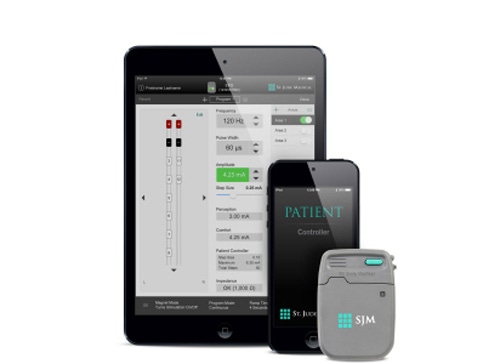FDA clears a novel chronic pain device from St. Jude Medical less than a month and half after European regulators give the green signal.
July 16, 2015

FDA clears a novel chronic pain device from St. Jude Medical less than a month and half after European regulators give the green signal.
Arundhati Parmar
St. Jude Medical's Invisible Trial System helps chronic pain patients evaluate spinal cord stimulation therapy to decide whether they want a permanent implant. |
St. Jude Medical announced Thursday that the FDA has cleared an external neurostimulation device controlled by an iPod Touch that can help chronic pain patients decide whether to opt for a permanent implant.
The clearance comes less than a month and a half after European regulators cleared the Invisible Trial System.
Patients using the system wear the external pulse generator under the clothing and control it using an iPod Touch to provide mild spinal cord stimulation intended to control pain. Physicians use an iPad mini to program the device and see whether the therapy is working.
If the trial experience is good and the spinal cord stimulation therapy appears to help, patients can opt to undergo a procedure where a permanent implant can be placed in their bodies.
"Patients undergoing SCS trials consistently tell us about challenges they find in navigating the SCS trial system, from programming the device, to discomfort from the programming cables, to management of both issues. These hindrances may impede the integration of the technology into their daily activities, which shifts their focus away from evaluating the effectiveness of SCS therapy,” said pain specialist Dr. Jason E. Pope, president of Summit Pain Alliance in Santa Rosa, California, in a news release from St. Jude Medical. “By providing a discreet trial system, St. Jude Medical will help patients focus more on their potential pain relief and functional improvements, and less about the burdens common to traditional trial systems.”
Other features of the iPod Touch are not activated and patients return the device after they have tried the system - the trial period typically lasts anywhere from 7 days to 2 weeks, explained Justin Paquette, a St. Jude Medical spokesman, in a previous emailed response.
The Invisible Trial System is another example of the brave world of convergence — this time between consumer tech and medtech — that is occurring in healthcare today.
"By providing a more patient-friendly option, we think we can shorten the learning curve related to trial programming devices and allow patients to better assess the potential pain relief they’re receiving from spinal cord stimulation.”
St. Jude Medical contends that chronic pain afflicts 1.5 billion globally.
Arundhati Parmar is senior editor at MD+DI. Reach her at [email protected] and on Twitter @aparmarbb
To learn more about medical devices and trends in the marketplace, attend the two-day MEDevice San Diego, September 1-2 |
You May Also Like


